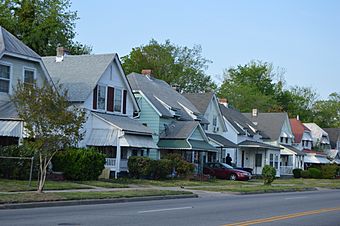Truxtun Historic District facts for kids
|
Truxtun Historic District
|
|

Portsmouth Boulevard west of Dahlia Street
|
|
| Location | Portsmouth and Deep Creek Boulevards and Manly, Dahlia, Hobson, Dewey and Bagley Sts., Portsmouth, Virginia |
|---|---|
| Area | 43 acres (17 ha) |
| Built | 1918 |
| Architect | U.S. Housing Corporation; Multiple |
| Architectural style | Colonial Revival |
| NRHP reference No. | 82004581 |
Quick facts for kids Significant dates |
|
| Added to NRHP | September 16, 1982 |
The Truxtun Historic District is a special neighborhood located in Portsmouth, Virginia. It's known for its unique history and the beautiful homes built there a long time ago. This area is recognized as an important historic place in the United States. It includes 241 buildings, mostly homes, that show how people lived in the early 1900s.
What Makes Truxtun Special?
Truxtun was built between 1918 and 1920. It was designed as a planned community, meaning everything was carefully thought out before construction began. The houses are built in a style called Colonial Revival. This style looks back to the architecture of early American homes, with features like grand entrances and symmetrical designs.
A Community Built for a Purpose
This neighborhood was created by the United States Housing Corporation. This government group was formed during World War I. At that time, many workers were needed at the Norfolk Naval Shipyard nearby. There weren't enough homes for all these new workers and their families. So, the government stepped in to help.
Truxtun was very important because it was the first government housing project built only for African-American residents during wartime. This was a big step in providing homes for all workers. After the war ended, in 1921, the federal government sold off the homes in the district.
Recognized for its History
Because of its unique history and well-preserved buildings, the Truxtun Historic District was added to the National Register of Historic Places in 1982. This listing helps protect the area and recognize its importance to American history.



